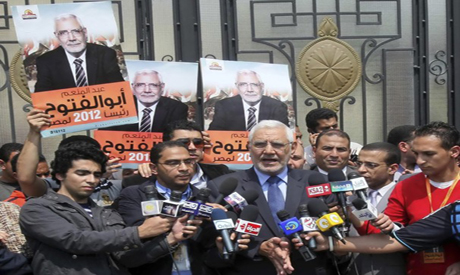 The rivalry between the Muslim Brotherhood and its candidate for presidency Mohamed Mursi, and the organisation's former leading member and popular presidential candidate Abdel-Moneim Abul-Fotouh has reached new heights, as the two sides start to attack each other directly in the media.
The rivalry between the Muslim Brotherhood and its candidate for presidency Mohamed Mursi, and the organisation's former leading member and popular presidential candidate Abdel-Moneim Abul-Fotouh has reached new heights, as the two sides start to attack each other directly in the media.
Official Brotherhood spokesperson Mahmoud Ghozlan published a 6 May op-ed entitled 'A Message to our Brothers in the Salafist Call' on the Muslim Brotherhood official website (www.ikhwanonline.com), blaming Salafists for endorsing Abul-Fotouh.
In the article, Ghozlan wondered why the Salafist body the Salafist Call had endorsed Abul-Fotouh for president, when in 2005 they refused to endorse the Muslim Brotherhood in the parliamentary elections because of then-member Abul-Fotouh's open views, which it considered to be anti-Islam.
Ghozlan even quoted parts of a brochure the Salafist Call had published, entitled 'Why We Will Not Elect the Muslim Brotherhood” which quoted Abul-Fotouh approving the right of a Christian Egyptian to rule Egypt, and standing against censorship of art.
He also quoted Sheikh Yasser El-Borhami, an influential sheikh in the Salafist movement and one of the founders of the Salafist Nour Party, who has announced his endorsement for Abul-Fotouh.
El-Borhami had praised the decision of the Brotherhood to expel Abul-Fotouh in 2011 because he considered him a reformist with dangerous views.
As one of the biggest Salafist religious groups in the country, the Salafist Call announced its support for Abul-Fotouh two weeks ago after holding internal elections where he won 80 per cent of the vote. Al-Nour Party’s parliamentary committee also held internal elections and chose to endorse Abul-Fotouh, who got 74 of the committee's votes compared with official Brotherhood candidate Mohamed Mursi's 30 votes.
Ghozlan's statement is considered to be by the far the most direct attack unleashed by the Muslim Brotherhood on its former member, who was expelled last year after expressing his intention to run for the presidency. He had for many years held opinions that differentiated himself from the conservative branch of the Muslim Brotherhood that dominates the organisation at the moment.
Ghozlan's attack is notable because it does not actually target the Salafist Call as much as the wider base of conservative Salafist voters who do not agree with Abul-Fotouh's views on censorship, religious minorities and women's access to the presidency.
For his part, Abdel-Moneim Abul-Fotouh criticised the Muslim Brotherhood and its famous leaders publicly on television last Sunday night, on the same night that the op-ed was published.
On Al-Nahar channel, Abul-Fotouh commented on an old photo of him and Brotherhood deputy chairman Khairat El-Shater, and another senior Brotherhood member Mahmoud Ezzat, during their imprisonment together in the mid-1990s, saying that the two did not respect the friendship or the brotherhood between Abul-Fotouh and themselves.
He also promised the citizens of Egypt that he would order the Brotherhood to declare its financial sources and to register itself as a religious group not as a political group, insisting that parties only should be allowed to have legal political activities.
This attack on the Brotherhood, according to observers, reassures voters that he is not a secret Brotherhood candidate, as was feared by some liberals and insinuated by some of his rivals.
As the presidential elections get underway, it is expected that Abul-Fotouh and his rivals in the Muslim Brotherhood will continue to battle for the critically important Islamist vote.



